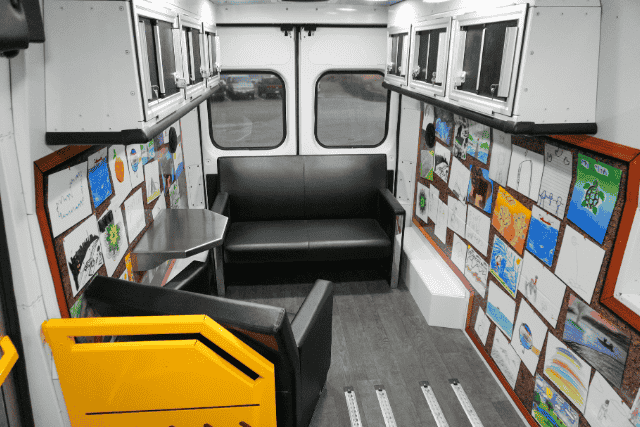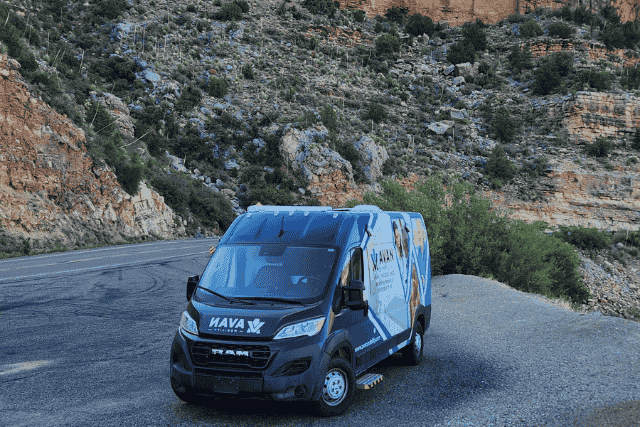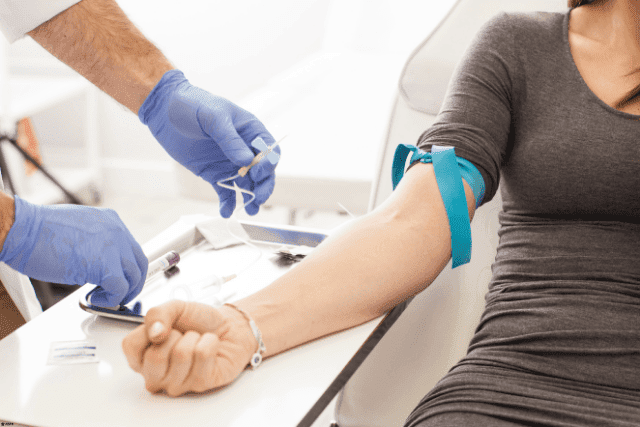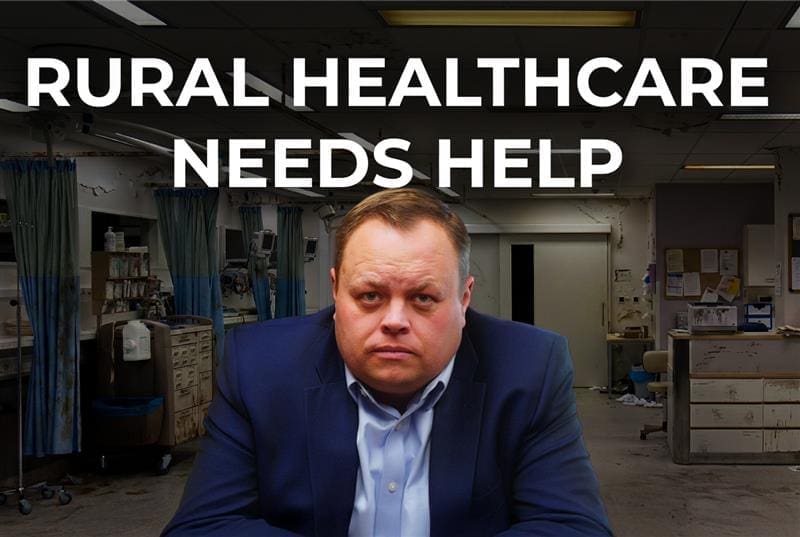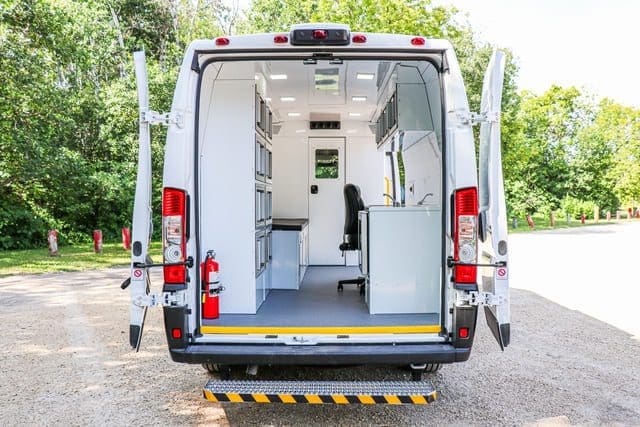Did you know that around 40% of adults in Oklahoma show signs of anxiety or depression, but over half don’t get help?
That’s a big problem. And if you’re running a behavioral health program or nonprofit in Oklahoma, you’re likely staring it in the face daily.
- Maybe you’ve had people in rural towns like Idabel or Guymon miss appointments because they couldn’t get there.
- Maybe you’ve heard, “I tried looking for counseling near me online… but there weren’t any organizations nearby.”
That’s a huge gap. And when care stays out of reach, people get left behind. You want to reach them, but you’re working with limited time, staff, and geography. A Mobile Counseling Van helps you close that gap and show up where people actually are.
AVAN Mobility has been building mobile medical vehicles for over 10 years. We work with healthcare networks, nonprofits, and outreach teams across the country to design vehicles that remove barriers to behavioral healthcare. We listen first, build second, and stay involved after delivery.
In this article, you’ll learn five specific ways a Mobile Counseling Van can help solve problems you’re already facing across Oklahoma.
Let’s get into it.
5 problems a Mobile Counseling Van can solve in Oklahoma
Oklahoma is facing a big mental health crisis that is in desperate need of a solution. Let’s take a look at the biggest problems it’s facing.
1. A Mobile Counseling Van brings mental health care to rural Oklahoma
Oklahoma’s wide open spaces are beautiful, but they make access to behavioral healthcare a challenge. Many small towns don’t have a full-time mental health therapist, and the nearest clinic might be hours away.
A Mobile Counseling Van changes that. It brings the counselor, the privacy, and the care directly to the people who need it in places where no office exists.
Rural towns are underserved and overburdened
Places like Hugo, Kingfisher, or Atoka are tight-knit communities, but they often lack mental health resources. Clinics are sparse. Waitlists are long. Transportation is limited. And that means people are slipping through the cracks, especially:
- Teens dealing with anxiety or depression
- Seniors feeling isolated but without nearby support
- Farmers or oilfield workers facing high stress and long hours, with no one local to talk to
These aren’t small issues. They’re daily realities in many corners of the state. A Mobile Counseling Van helps you meet those people where they already are, whether it’s parked outside a community center, school, or church parking lot. You don’t wait for people to come to you. You go to them.
Breaking the cycle of no-shows and burnout
When your only clinic is two hours away, it’s no surprise when clients cancel. Transportation issues, weather, or work schedules get in the way. That hurts the client, but it also affects your team. Burnout grows when counselors drive hours between appointments or deal with gaps in care.
A Mobile Counseling Van helps reduce:
- No-shows: The clinic comes to the client, not the other way around
- Delays: You can rotate the van across counties on a schedule
- Burnout: Staff stay closer to home with better-planned service routes
Real impact: Some behavioral health programs in western Oklahoma can serve three towns in one week in areas with zero counseling options.
That’s the power of showing up. You build trust, grow consistency, and make behavioral health care something people can count on.
2. A Mobile Counseling Van helps clients keep their appointments
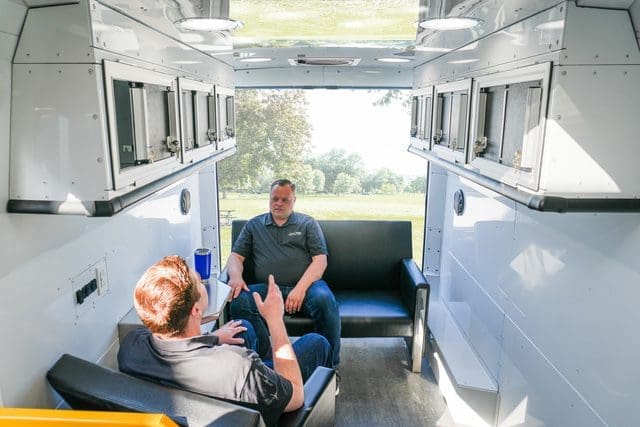
You’ve probably lost count of how many appointments have been missed because someone couldn’t get there. Transportation is a constant barrier in Oklahoma, especially in rural counties or neighborhoods without transit options. A Mobile Counseling Van helps you take that barrier off the table by meeting people where they are.
No ride shouldn’t mean no care
Across Oklahoma, many clients don’t have access to a reliable car. Some live miles outside of town with no bus stop in sight. In Tulsa and Oklahoma City, public transit can be spotty and slow. And for folks in places like Seminole, Jay, or Anadarko, the closest behavioral health clinic might be an hour away.
It’s not that people don’t want help. They just can’t get there.
A Mobile Counseling Van turns that around. You can bring licensed counselors to:
- Local schools where students are already
- Community centers in small towns
- Tribal health centers or other outreach spots
- Faith-based programs that serve as trusted touchpoints
Instead of asking people to rearrange their lives for care, you bring care to their everyday routine.
Building trust with consistency
Missed appointments hurt both schedules and relationships. Clients feel frustrated or embarrassed. Counselors feel like they’re spinning their wheels. A Mobile Counseling Van helps build a rhythm and routine that people can depend on.
Why does it work so well?
- Fewer barriers: No need to find a ride or take a day off
- More privacy: Clients don’t have to walk into a visible building
- Higher attendance: You’re showing up in spaces that feel safe and accessible
If you’re an outreach team in Oklahoma, going mobile may be enough to reduce your no-show rate by half.
That’s a big shift. And it means people get the mental health support they’ve been looking for without the stress of getting there.
3. A Mobile Counseling Van offers privacy and dignity for clients
In many Oklahoma communities, getting help for mental health or behavioral health is still something people feel nervous talking about. The stigma is real, and it keeps a lot of folks from stepping forward, especially in small towns where everyone knows everyone. A Mobile Counseling Van creates a safe, private space where people can get care without fear of judgment.
Privacy matters more than we think
In rural places like Alva or Tishomingo, walking into a counseling clinic might feel like making a public announcement. People worry about being seen, being talked about, or even being misunderstood by their own family. This kind of fear keeps too many people silent.
But when care comes in a mobile van, it can blend right into everyday life. The van might park at a school, a food bank, or even a town fair. It doesn’t scream “clinic.” It just shows up where life is already happening.
- Clients don’t have to explain where they’re going
- They don’t have to feel exposed
- They just step inside a calm, private space
Inside, the layout is made for comfort. Many of our vans include:
- Soft lighting and climate control for a relaxed feel
- Sound privacy features so conversations stay private
- Comfortable seating for longer counseling sessions
That kind of setup can make all the difference in helping someone open up.
Supporting trauma-informed care in real time
Privacy isn’t just about comfort, it’s about care. Many people across Oklahoma, especially in underserved communities, carry past trauma. From veterans and foster youth to those dealing with substance use or abuse recovery, trauma-informed behavioral health depends on creating safe environments.
A Mobile Counseling Van lets you build that space from the ground up. You can set the tone with calming colors, create flexible layouts for one-on-one or small group sessions, and even include equipment for telehealth when needed.
Here’s how it helps:
- Trauma survivors feel less exposed
- Youth feel more secure in an age-friendly setting
- Rural residents feel less pressure from small-town eyes
Sometimes, just having the option for a mobile, private space can help you connect with clients who had previously refused in-office visits.
Sometimes, privacy is the first step to progress.
4. A Mobile Counseling Van helps reach youth and Indigenous communities across Oklahoma
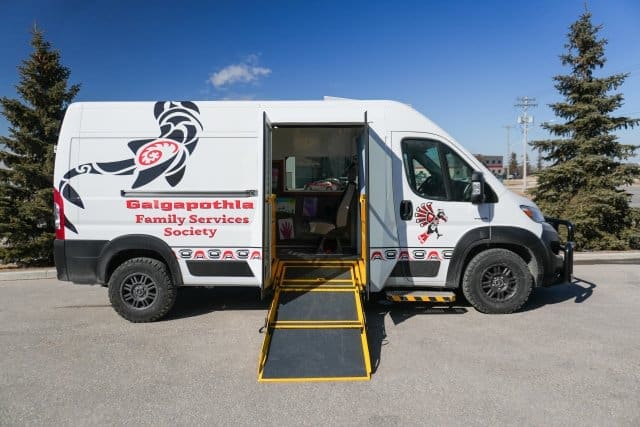
Oklahoma is home to a large population of youth facing mental health challenges, and 39 federally recognized Tribal Nations. Both groups face serious gaps when it comes to access, equity, and support for behavioral health intervention services. A Mobile Counseling Van gives you a way to connect with these communities in a consistent, respectful, and culturally aware way.
Youth mental health is in crisis
In Oklahoma, suicide is the second leading cause of death for ages 10 to 24. That’s a hard truth, but one we can’t ignore.
Schools in places like Tahlequah, Ardmore, or Woodward might not have a full-time counselor. And even when they do, students may not feel comfortable walking into the counselor’s office with everyone watching. It doesn’t take much to push a struggling teen back into silence.
Mobile Counseling Vans can quietly show up right where students are.
Set up outside the school. Create a welcoming, judgment-free zone. Offer regular hours for students to step inside for a check-in, a full session, or a quick talk.
You can even rotate visits between middle schools and high schools in your region. No long drives. No big red flags.
Serving Indigenous communities with respect and flexibility
For Tribal communities across Oklahoma, like those in Okmulgee, Anadarko, or Broken Bow, accessing behavioral healthcare often means traveling outside the community. And in many cases, services don’t reflect their cultural values, languages, or traditions.
That’s a huge gap. A Mobile Counseling Van gives Tribal health programs a tool they can customize and control. The vehicle becomes part of the community’s own system, not something brought in from the outside.
Key benefits for Indigenous outreach:
- Build trust: Staff the van with Tribal members or local partners
- Support traditions: Use the space for healing circles or culturally informed practices
- Improve continuity: Bring the same counselor back each week or month
We’ve partnered with Tribal health organizations across the country who use mobile clinics to expand behavioral health outreach in ways that fit their people, not the other way around.
When you meet people where they are, on their terms, you’re not just filling a service gap. You’re building trust that lasts.
5. A Mobile Counseling Van improves response to crisis and high-risk situations
When someone is in a behavioral health crisis, time matters. But in many parts of Oklahoma, especially rural counties, help can be too far away or unavailable. A Mobile Counseling Van gives your team the flexibility to respond faster, stabilize situations on site, and offer immediate care before things get worse.
Gaps in crisis response leave people waiting
Mental health response teams may be limited or completely absent in counties like Harper, Pushmataha, or Coal. Law enforcement often becomes the default responder, even when the situation isn’t a law enforcement issue.
That creates risk for everyone involved:
- For the person in crisis: Delayed care can escalate the situation
- For law enforcement: Responders may not be trained in de-escalation for behavioral health
- For hospitals: Emergency rooms fill with behavioral health cases that aren’t true medical emergencies
With a Mobile Counseling Van, your team can show up where it’s needed quickly—with the tools and environment built for calm and care.
Supporting mobile crisis teams and community outreach
We’ve seen teams across the U.S. use mobile units to support 24/7 crisis response or ride-along programs.
In Oklahoma, this kind of mobile approach can support:
- Outreach teams in Oklahoma City and Tulsa during high-volume calls
- County-based programs looking to expand services without building new facilities
- Nonprofits and Tribal services that already respond to community needs but need more structure and space
Inside the van, there’s room for private conversation, safety features for staff and clients, and even equipment for virtual consults if needed. You can also store supplies for harm reduction, first aid, or basic care needs.
Mobile Counseling Vans work because you’re ready. The van becomes a flexible tool that can shift from a counseling space to a triage site in minutes. And the impact? Less strain on 911, fewer emergency room visits, and more people getting the right care at the right time.
Want to learn more about the Mobile Counseling Van?
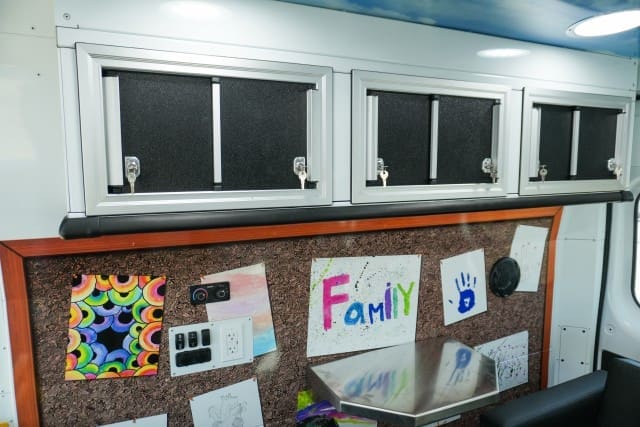
You came here because you’re tired of running into the same roadblocks. Maybe it’s missed appointments, long drives, lack of privacy, or just not having the tools to reach people who need care. You’re looking for something that actually works—something that meets people where they are and finally closes the gap.
Here’s what you learned:
- Rural care gaps shrink when your team goes mobile
- Appointments increase when transportation isn’t a barrier
- Privacy improves when care doesn’t come with stigma
- Youth and Tribal outreach grows with tailored solutions
- Crisis response gets faster with boots-on-the-ground flexibility
At AVAN Mobility, we build mobile medical vans that don’t just solve technical and health problems, they solve people problems. We help community leaders, health directors, and nonprofit teams like yours design mobile units that match your mission and your map.
We know every region is different, which is why every van we build starts with a conversation, not a catalog. That’s how we’ve helped organizations across the U.S. launch mobile programs that are changing lives.
You’ve got the heart. We’ve got the vehicle. And we’re proud to be in your corner.
If you have questions, click the button below to speak with a mobility expert who actually listens.
Not ready to talk just yet? Here are a few helpful reads to keep going:
If you’re having trouble securing grants for mobile medical units, start by checking out our guide. This should help you navigate the funding process a little easier.
After that, read our article on mobile crisis units vs. fixed crisis units. This will help you realize the impact of going mobile.
